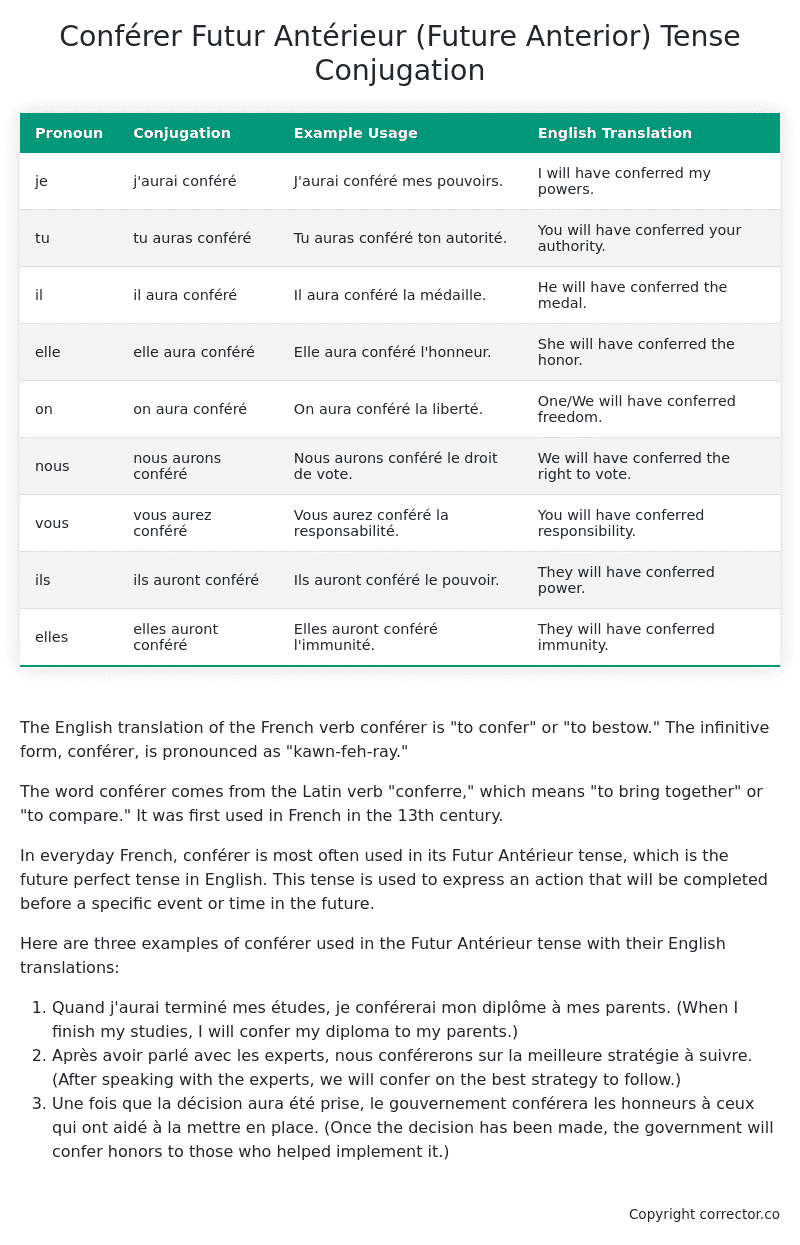Futur Antérieur (Future Anterior) Tense Conjugation of the French Verb conférer
Introduction to the verb conférer
The English translation of the French verb conférer is “to confer” or “to bestow.” The infinitive form, conférer, is pronounced as “kawn-feh-ray.”
The word conférer comes from the Latin verb “conferre,” which means “to bring together” or “to compare.” It was first used in French in the 13th century.
In everyday French, conférer is most often used in its Futur Antérieur tense, which is the future perfect tense in English. This tense is used to express an action that will be completed before a specific event or time in the future.
Here are three examples of conférer used in the Futur Antérieur tense with their English translations:
- Quand j’aurai terminé mes études, je conférerai mon diplôme à mes parents. (When I finish my studies, I will confer my diploma to my parents.)
- Après avoir parlé avec les experts, nous conférerons sur la meilleure stratégie à suivre. (After speaking with the experts, we will confer on the best strategy to follow.)
- Une fois que la décision aura été prise, le gouvernement conférera les honneurs à ceux qui ont aidé à la mettre en place. (Once the decision has been made, the government will confer honors to those who helped implement it.)
Table of the Futur Antérieur (Future Anterior) Tense Conjugation of conférer
| Pronoun | Conjugation | Example Usage | English Translation |
|---|---|---|---|
| je | j’aurai conféré | J’aurai conféré mes pouvoirs. | I will have conferred my powers. |
| tu | tu auras conféré | Tu auras conféré ton autorité. | You will have conferred your authority. |
| il | il aura conféré | Il aura conféré la médaille. | He will have conferred the medal. |
| elle | elle aura conféré | Elle aura conféré l’honneur. | She will have conferred the honor. |
| on | on aura conféré | On aura conféré la liberté. | One/We will have conferred freedom. |
| nous | nous aurons conféré | Nous aurons conféré le droit de vote. | We will have conferred the right to vote. |
| vous | vous aurez conféré | Vous aurez conféré la responsabilité. | You will have conferred responsibility. |
| ils | ils auront conféré | Ils auront conféré le pouvoir. | They will have conferred power. |
| elles | elles auront conféré | Elles auront conféré l’immunité. | They will have conferred immunity. |
Other Conjugations for Conférer.
Le Present (Present Tense) Conjugation of the French Verb conférer
Imparfait (Imperfect) Tense Conjugation of the French Verb conférer
Passé Simple (Simple Past) Tense Conjugation of the French Verb conférer
Passé Composé (Present Perfect) Tense Conjugation of the French Verb conférer
Futur Simple (Simple Future) Tense Conjugation of the French Verb conférer
Futur Proche (Near Future) Tense Conjugation of the French Verb conférer
Plus-que-parfait (Pluperfect) Tense Conjugation of the French Verb conférer
Passé Antérieur (Past Anterior) Tense Conjugation of the French Verb conférer
Futur Antérieur (Future Anterior) Tense Conjugation of the French Verb conférer (this article)
Subjonctif Présent (Subjunctive Present) Tense Conjugation of the French Verb conférer
Subjonctif Passé (Subjunctive Past) Tense Conjugation of the French Verb conférer
Subjonctif Imparfait (Subjunctive Imperfect) Tense Conjugation of the French Verb conférer
Subjonctif Plus-que-parfait (Subjunctive Pluperfect) Tense Conjugation of the French Verb conférer
Conditionnel Présent (Conditional Present) Tense Conjugation of the French Verb conférer
Conditionnel Passé (Conditional Past) Tense Conjugation of the French Verb conférer
L’impératif Présent (Imperative Present) Tense Conjugation of the French Verb conférer
L’infinitif Présent (Infinitive Present) Tense Conjugation of the French Verb conférer
Struggling with French verbs or the language in general? Why not use our free French Grammar Checker – no registration required!
Get a FREE Download Study Sheet of this Conjugation 🔥
Simply right click the image below, click “save image” and get your free reference for the conférer Futur Antérieur tense conjugation!

Conférer – About the French Futur Antérieur (Future Anterior) Tense
Construction
Common Everyday Usage Patterns
Interactions with Other Tenses
For example
Summary
I hope you enjoyed this article on the verb conférer. Still in a learning mood? Check out another TOTALLY random French verb conjugation!


